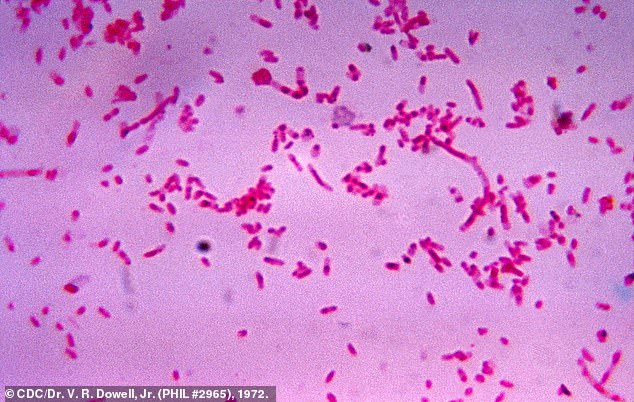Scientists have discovered that a bacteria commonly found in the mouth appears to “melt” and destroy certain types of cancer.
Researchers were surprised to find that head and neck cancer patients who had Fusobacterium in their tumors had “much better outcomes.”
Experts are further investigating the exact biological mechanisms behind this relationship.
In laboratory studies, the team at Guy’s and St Thomas’, King’s College London, placed quantities of the bacteria into petri dishes with cancer cells and left them for a couple of days.
They found that there was a 70 to 99 percent reduction in the number of viable head and neck cancer cells after being infected with Fusobacterium.
A bacteria commonly found in the mouth appears to “melt” and destroy certain types of cancer, according to new research

Researchers were surprised that head and neck cancer patients who had Fusobacterium (seen) inside their tumors had “much better outcomes”

Pictured: Dr Anjali Chander and Dr Miguel Reis Ferreira, whose study made the “remarkable and very surprising” discovery
A subsequent analysis of 155 patients with head and neck cancer showed that those who had the bacteria inside their tumors had better chances of survival compared to those who did not, with a 65 percent reduction in the risk of death.
Researchers hope the findings could help guide treatment for patients with head and neck cancer, which includes cancers of the mouth, throat, larynx, nose and paranasal sinuses.
Experts said there have been few therapeutic advances in this field in the past 20 years, and it is hoped the discovery could potentially lead to new treatments in the future.
“Essentially, we found that when these bacteria are found in head and neck cancers, the outcomes are much better,” said senior author Dr. Miguel Reis Ferreira.
‘The other thing we found is that, in cell cultures, this bacteria is able to kill cancer.
‘This research reveals that these bacteria play a more complex role than previously known in their relationship with cancer: basically, they melt head and neck cancer cells.
“What this could mean is that we can use these bacteria to better predict which patients are more likely to have good or worse outcomes.”
He added: “Based on that, we might change their treatment to make it more benign in patients who have better outcomes, or make it more intense in patients who are more likely to have their cancers come back.”
Dr Anjali Chander, a senior clinical research fellow at King’s College London and lead author, added: “Our findings are remarkable and very surprising.”
The team has published a paper on their discovery in the journal Cancer Communications, describing how Fusobacterium is “toxic” to head and neck cancer and how its presence “may determine a better prognosis.”
“Fusobacterium detectability was associated with better overall survival and better disease-specific survival,” the authors wrote.

